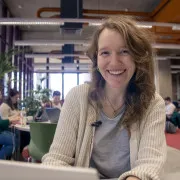
Marcel Wojzechowski studiert im 2. Semester Sozialwissenschaften. Sein angestrebter Abschluss ist der Master of Education. Marcels zweites Fach ist Erziehungswissenschaften. Außerdem ist er im Fachschaftsrat aktiv.
Wieso haben Sie sich damals für Ihr Studienfach entschieden?
Ehrlich gesagt war Sowi bei mir als Schulfach sehr beliebt. Man beschäftigt sich mit der Realität von Menschen und erklärt diese Realität im wissenschaftlichen Diskurs, man kommt hinter verborgene Mechanismen, wie unsere Welt funktioniert. Hierbei ist man thematisch höchst flexibel und kann sich zwischen eher politischen, wirtschaftlichen oder soziologischen Themenfeldern entscheiden oder solche mischen. Aus meiner Sicht werden hier alle vom Theoretiker bis zum Praktiker glücklich.
An welchen Stellen haben sich die Erwartungen an Ihr Studienfach erfüllt, an welchen nicht?
Nun gut, die hohe Freiheit ist, wie in jedem anderen Studium, erst einmal nicht gegeben gewesen. Aller Anfang war der Aufbau einer soliden Basis, um fähig zu sein, überhaupt am wissenschaftlichen Diskursteilzunehmen. Beispielsweise der Zweig der Wirtschaftswissenschaften entsprach überhaupt nicht meinen Erwartungen, wenngleich gerade dieser Bereich, was mich selber sehr überraschte, ziemlich interessant wurde und es immer noch ist.
Wie angesprochen, bestätigte sich mein Bild im Laufe des Studiums, dass es eine enorm große Vielfalt an Themen und deren Verknüpfung gibt. So betrachtete ich soziokulturelle Klassenkämpfe auf dem Fußballfeld, setzte mich mit Jugendsubkulturen und ihrer sozialhistorischen Genese auseinander und bereitete, im Rahmen eines Seminares mit Kommilitoninnen und Kommilitonen, eine Begehung des Phönix-Sees für Privat-Interessierte vor (nur um einen winzigen Einblick zu geben).
Was macht Ihnen in Ihrem Fach am meisten Spaß?
Die Arbeit mit den Kommilitoninnen und Kommilitonen, besonders die Arbeit im Fachschaftsrat mit den Studierenden für die Studierenden macht sehr viel Spaß. Thematisch auf das Studium bezogen zeigte sich, dass die Soziologie mein favorisierter Bereich ist, da sie einen unwahrscheinlich großen Bezug zu meinem Lieblingsthema die verschiedenen Jugendsubkulturen ab 1945 hat. Hier lässt sich ziemlich viel mit eigenen Ideen in Verbindung mit Klassikern wie Pierre Bourdieu erklären.
Was war bisher die größte Herausforderung?
Thematisch und inhaltlich habe ich mich sofort gut verortet gefühlt. Wissenschaftliches Arbeiten zu erlernen, in Abgrenzung zur gewöhnlichen „schulischen“ Arbeit mit Texten, ist wohl die Königsdisziplin und hat mir einige Rückschläge bereit, bevor ich anhaltende Erfolge verzeichnen konnte. Wie sagt man so schön: „Es ist noch kein Meister vom Himmel gefallen“.
Was wollen Sie einmal damit werden?
Das Ziel meines Studiums ist ein Beruf im Bildungssektor. Um genau zu sein der Abschluss des Master of Education mit anschließendem Eintritt in den Schuldienst. Ich könnte mir ebenso, nach Abschluss der Lehrerausbildung, einen Job im Bereich der Erwachsenenbildung, sowohl im öffentlichen als auch im privaten Bereich, vorstellen.
Welche Tipps geben Sie den Leuten, die auch überlegen, Ihr Fach zu studieren?
Im Grunde denselben Tipp, den ich jedem Studierenden gebe: Schaut euch unsere Einführungsvorlesungen an, nehmt teil, und guckt euch an, was euch interessiert. Wenn es Politik, Wirtschaft und Gesellschaft (PWG) ist, habt ihr viel zu entdecken und könnt euch selbst davon überzeugen. Lasst euch nicht durch das anfängliche Gegängel abschrecken. Nach zwei Semestern erkennt ihr den tieferen Sinn dahinter. Bei Rückfragen und Unsicherheiten könnt ihr euch jederzeit an die helfenden Kommilitoninnen und Kommilitonen vom Tutor/innen-Programm oder an den Fachschaftsrat wenden, was ich am Anfang meines eigenen Studiums nicht tat (lacht). Es kann nur helfen.



